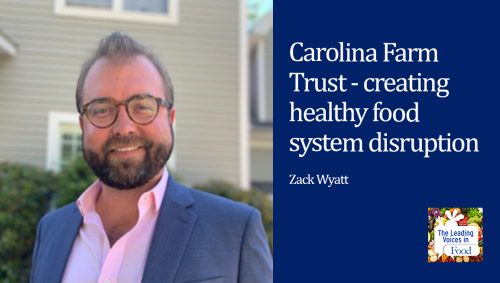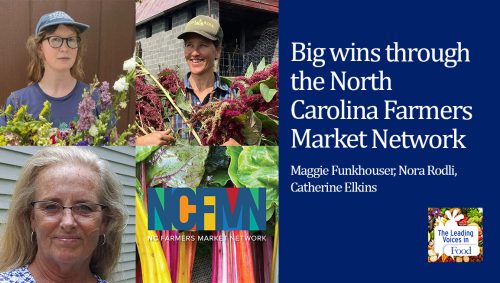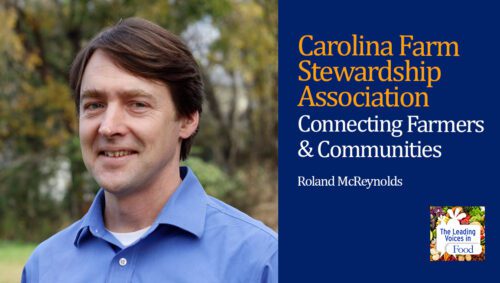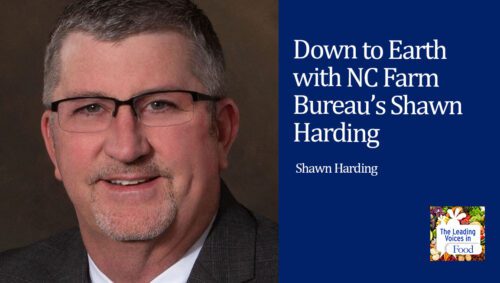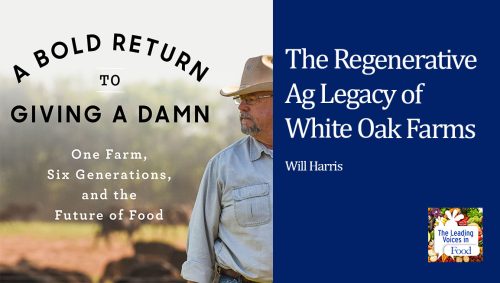The Leading Voices in Food
E68: Tobacco, Hemp & Trade Wars
Some farmers see industrial hemp as an opportunity to transition away from tobacco. Hemp is widely grown worldwide as a source of both fiber and oil seed. Harvesting equipment and dryers used for tobacco can also be used to harvest and cure hemp, allowing farmers to repurpose equipment they already own. North Carolina legalized hemp production in 2014 as part of a pilot program. Brandon Batten is one of the farmers producing industrial hemp as part of this program.
Subscribe: Apple Podcasts | TuneIN | Google Podcasts | SoundCloud | PocketCasts | Radio Public
Tags: Agriculture & Tech | North Carolina | Voice of Farming |

Brandon Batten is a co-owner of Triple B Farms in North Carolina. He is part of North Carolina’s pilot hemp program, and is a graduate of North Carolina State University.
Interview Summary
Welcome to The Leading Voices in Food Podcast, an educational series produced by the World Food Policy Center at Duke University. I’m Deborah Hill. You’re listening to a segment in our Voice of Farming series.
Tobacco has long been North Carolina’s largest cash crop, but today, there are only around 2,000 tobacco farms in the state. Tobacco smoking in the US has been steadily declining, and the 2004 tobacco buyout ended federal tobacco marketing quota and price support loan payments. In recent years, about 75% of the tobacco grown in the state was exported abroad, much of it to China. This has come to a dramatic stop in the wake of the China-US trade war.
Farmers understand that fair trade doesn’t come without a price, but many North Carolina farms are feeling the impact deeply. To ease the impact of the tariff war on US farmers, the Trump Administration made 12 billion in payments to help farmers who have lost sales. But because of its health stigma, tobacco was excluded from the support. Today I’m talking with tobacco and hemp farmer Brandon Batten of Triple B Farms in Four Oaks, North Carolina.
Right now, we’re just over a year, I guess, into the trade war with China. China is our biggest customer, especially for our tobacco. Eighty percent, 90% of the tobacco we grow goes to China on our farm, and other crops too, but we have really good, really well drained soils for tobacco and sweet potatoes and some other crops, but they’re not as good at producing corn and soybeans because they kind of require different environments. With the tobacco and the trade war, China didn’t buy any tobacco in 2018 from the US. They’re not buying any in 2019, and with that being our primary market, our contracts are seeing a lot of downward pressure. Our volumes have been cut significantly, and who knows when this thing will be resolved?
Other commodities have seen similar downward pressure on prices. Some of the markets we’re losing have taken generations to build and have basically been lost in a year. They may come back or they may not. That’s kind of one of those things that keeps you awake at night, worrying about the future. Especially for not just now, for me, for the next year, the next five years, but what about the next generation?
Tobacco has been in our operation a long time. It’s been a huge part of North Carolina. It’s built a lot of colleges and churches, and paid for a lot of things, including my education. I think that as long as there is tobacco growing, I think it will be grown in Eastern North Carolina, because we have a kind of a perfect storm of climate, soils, and conditions to make a really high quality, really premium flavor tobacco that can’t be replicated anywhere else in the world. Everybody can do it cheaper than we can, but nobody can do it as sustainably or as good as we can, at least not right now. I don’t think … I think tobacco is definitely diminishing, definitely shrinking. I don’t think it’s going to go away. As long as it’s legal, I think there will be tobacco here just because it’s a perfectly suited environment for it.
As far as our operation, I’m not sure. Right now, that’s kind of the million dollar question. What’s next if tobacco does leave? We’re certainly hopeful that that tobacco will have a place on our farm, but I’m trying to reduce our dependence on it at every chance I get with other crops and through other ventures. So with tobacco, since the end of the government program in 2004, which was the government price support program; there was a buyout of that program, and now tobacco is a free commodity, just like anything else. Anybody can plant it. There’s no quota or allotment, per se, from the government.
But the companies today won’t buy tobacco except from the year … So in 2019, they buy tobacco grown in 2019. And if you have tobacco left over in 2020, they don’t want it. They can keep it for several years once it has been processed through some of the primary in their plants, but as far as farm level storage of tobacco, it doesn’t exist anymore. There’s no market for carryover tobacco from year to year. It’s just one of those things, but we’re also in a very oversupplied market right now as well, so they don’t have to buy it because they know they can get more in the year ahead.
While the legalization of marijuana across the United States gets all the attention, there is a close cousin of the plant, hemp, which is having a moment. It’s not the fiber of the plant, which can be used to make everything from T-shirts to tote bags, but the oil called CBD, that can be pressed from the flower.
Some farmers see industrial hemp as an opportunity to transition away from tobacco. Hemp is widely grown worldwide as a source of both fiber and oil seed. Harvesting equipment and dryers used for tobacco can also be used to harvest and cure hemp, allowing farmers to re-purpose equipment they already own. North Carolina legalized hemp production in 2014 as part of a pilot program. Batten is one of the farmers producing industrial hemp as part of this program.
So industrial hemp is a new crop we’re trying. I think this the second or third year of the pilot program in North Carolina since it was legalized in the 2018 Farm Bill. But there’s still a lot of controversy around hemp, and there’s still a tremendous amount of uncertainty because right now, there’s basically no regulation as far as the selling of it. We do have to get a license from the state and adhere to state testing standards to make sure that the THC level stays below 0.3% so that it is qualified as industrial hemp instead of marijuana, because it’s the exact same plant. It’s just the chemical makeup is a little different than the marijuana that is still illegal. There’s a lot of people coming out saying, “Okay, I’ll buy your hemp,” and then a farmer will grow it, and I’ve heard stories of them not getting paid.
So that’s a huge challenge to overcome. There’s also some legislative challenges, especially in North Carolina with people maybe not being as open and accepting to this new crop. I’ve heard hemp touted as the savior of the South, or this will replace tobacco. I’m not quite that optimistic yet. There’s a lot of people that, even around here in this rural area where I live, that have admitted to using some CBD for different things, and the CBD oil is helping them. And I’m not sure if it’s physiological or psychological, but if it’s helping them, who am I to say not use it? The hemp we grow will be used to produce CBD oil.
I’m optimistic. I’m not ready to bet the farm on it, but I tell people jokingly I was scared to death to try some, but I’m scared not to try it as well. So we’ll see how it shakes out. Our hemp, I’m not sure what it’s supposed to look like, but it looks really good to me. It’s very robust, it seems to work well in our system that we have on the farm and our equipment and everything. So who knows? I think it could have a place on our farm in the future for sure if the marketing aspect of it goes well and the testing.
Hemp looks and smells like marijuana, but can’t get users high because it has very little of the chemical tetrahydrocannabinol, or THC. There’s a demand for hemp and Cannabidoil oil, also known as CBD, as a treatment for epilepsy and chronic pain. Hemp and extract such as CBD can now be commercially produced, distributed, and sold in North Carolina, as long as the hemp plant and its products contain less than 0.3% THC.
I think with the passing of the 2018 Farm Bill and at the same time that the tobacco industry was in decline, it kind of was just a natural fit. A lot of the same equipment we use in tobacco, we use in hemp as far as the tillage equipment and the field equipment, as well as the drying barns. Hemp has to be dried after it’s harvested. Not as long as tobacco, but the facilities are the same. So we haven’t had to buy anything except the plants to kind of try the hemp. That was the appeal to us, and I think that’s really the appeal for North Carolina, it’s because we have the infrastructure to handle it. We have the equipment and the knowledge. So, you know, why not? I’m glad that that our legislators and that governing body of the Hemp Commission had the foresight to put this pilot program in there and lay the groundwork for North Carolina to be a possible industry leader in this crop.
Along with industrial hemp, when you start talking about hemp for fiber, I think there’s an opportunity for the textile industry that used to be so huge in North Carolina possibly making a comeback. It’s almost like a, “Which came first, the chicken or the egg?” Everybody says, “Well, there’s no hemp fiber plants so I’m not going to plant the hemp for fiber,” and then the plant people say, “Well, there’s no hemp for fiber so we’re not going to be able to plant.” You know, I think it’s going to kind of take some collaboration in the industry to get this done and figure out how many acres are needed to support a plant per se. And I’ve heard of some being built around in Kentucky and other places. I think there is certainly an opportunity for the fiber industry to make a comeback with … The textile industry to make a comeback with the hemp fiber, just because it can be grown very well in North Carolina.
One of the challenges of raising hemp is that markets and regulations are still in the early stages of development and that translates into uncertainty for farmers.
I mean, industrial hemp is a huge investment compared to other crops we grow. You’re talking about two or three times the cost per acre of money to put in the plants and the work, because it is a very labor intensive crop. Everything has to be done by hand steel. But likewise right now, it has the promise of a very high return. But with the market for hemp, with everybody kind of jumping on this train, there’s a lot of people that may not be as reliable as others as far as outlets, selling points for my hemp. We’re contracted with a company that may not have the highest price, but I feel like has a reputation that they will at least have the money to pay me when I deliver the crop. Some other markets, like tobacco for example, tobacco is not allowed to be promoted by the government abroad.
US tobacco, those markets have basically been created by farmers and by the Commissioner of Agriculture and other people taking those trips to China, and meeting with people, and trying to get our foot in the door. Now, we’ve kind of lost that. That particularly hurts because I’ve been to foreign countries and sat in US embassies, and listened to their agriculture ambassador tell them all the great work they’re doing promoting US cotton and US soybeans, and US corn. You ask them about tobacco, they won’t even answer you because they’re just not allowed to talk about tobacco abroad.
That’s kind of frustrating when you’re already dealing with a luxury crop that people don’t have to have. It’s really a luxury and you’re fighting with one hand tied behind your back to start with. I think hemp is an industry begging for a little bit of regulation, just because there’s so many people coming into this space and so many … It’s being compared to the Wild Wild West, and I’ve kind of seen it. There’s a lot of different things, rumors floating around, and people come in to buy. People see it and think you’re growing marijuana, so there’s a lot of education to be done, but it is a lot of work to develop this market. I think North Carolina is positioned to be a leader in the hemp industry with the proper legislative support and the proper market channels to get our crop sold.

